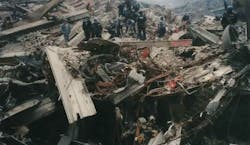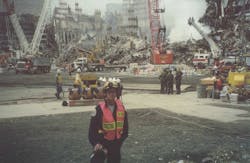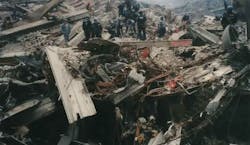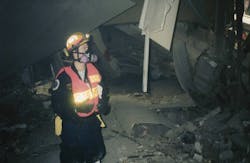On the evening of September 11, 2001, I was sitting in an airplane hangar in Homestead, Florida, waiting to be sent into the heart of darkness. I was part of a search and rescue team headed to Ground Zero to look for survivors. We were trained for heavy rescue in urban settings, but nothing could have prepared us for this.
As a Structural Specialist, I am available to be temporarily mobilized by the FEMA Urban Search and Rescue system when catastrophic events occur. I use my technical abilities to help make missions safer for rescuers. We assess the stability of damaged structures to guard against the dangers of secondary collapse and use mitigating strategies such as shoring and bracing to make those unstable structures more secure. Using advanced tools, we monitor damaged structures for movement to help ensure that conditions are stable during rescue operations. In short, we are tasked with making the best out of what are inherently dangerous conditions for the rescuers. In this context, I served as a first responder at the World Trade Center.
We would eventually spend eight days working at the World Trade Center site. I am often asked what it was like to be there—it is impossible to fully describe. Most Americans were at home feeling helpless, with the world at a standstill, being constantly inundated with images of the event playing over and over. But actively engaged in the mission, I was occupied with my duties rather than the paralyzing dread felt by the rest of the world. More importantly, having a mission made me feel like I was doing something, anything. It made me feel like I could help, which, in turn, made me feel not so helpless.
Despite everything I witnessed, I came away from the experience with a new sense of hope and a renewed faith in humankind. I realize that might be a surprising, possibly even an outrageous thing to say. But it’s true. Across the country, we were frightened, and we were angry, yet almost without fail I saw people react with courage, compassion, and charity. For a short time, I believe we managed to find the better angels of our nature.
I stood on top of that smoldering pile of debris of once proud buildings. I watched, on numerous occasions, as hundreds of workers fell silent while the flag-draped stretcher of a fallen hero was lifted out of the rubble and passed hand over hand by a continuous line of firefighters. I sat one-on-one and looked into the hollow eyes of New York City firefighters as they talked about the buddies they had lost.
But grief was not the whole story. There were also experiences, big and small, that lifted me up and gave me reason to believe.
When I talked to those firefighters about their lost friends, I often tried to offer condolences that were wholly inadequate. At a loss for words, I remember saying to one, “it’s a shame there wasn’t some way to warn them that the buildings were about to collapse.” He said to me, “it wouldn’t have mattered, they would have tried to help anyway.”
On that day, 411 rescue workers were lost in the effort to save others. There are countless stories of individual heroism amongst the fallen and each one should be remembered and celebrated. But there is also a larger picture that I find even more compelling. Those 411 brave souls that lost their lives that day were only a fraction of the thousands of rescuers that rushed toward danger that morning. And they were only a portion of the thousands of others who would have gone had they been on duty. And there are thousands more like them in every community across the country who would go if it happened in their city.
Yes, we live in a world where tragedies like this exist. But we also live in a world where millions of everyday heroes would risk their own lives to save them. In my book, those are pretty good odds.
The sacrifices of our fallen heroes are almost beyond belief but what truly astounds me is just how widespread this willingness to sacrifice can be found.
Beyond the heroics of our rescue workers, there were countless other signs of humanity throughout this country. In the days and weeks after 9/11, the innate goodness came out in people. Everywhere we went, the emotions of gratitude and support poured out at us. I can’t tell you how many times I was stopped on the street and hugged by complete strangers. I was witness to, and the recipient of, countless acts of simple kindness, compassion, and decency.
Our everyday lives are bound up in petty differences, frivolous desires, and trivial concerns. But tragedy has a way of breaking through the clutter and exposing the core of our humanity. And it changed us for the better, at least for a short while.
As a first responder, I have been sent to many of the worst tragedies in modern history. In the intervening years, I have spent time in Haiti after an earthquake and the Gulf Coast after Katrina, among other large-scale disasters. It can weigh heavily on the soul, but I am continually uplifted at the human capacity for courage and compassion in the face of tragedy. It inspires me to believe that the human race is capable of so much more.
The words “Never Forget” are used a lot in the face of tragedy. It’s true we should never forget 9/11, but what we remember from that day matters a great deal.
Above all, remember humanity, remember courage, remember heroism, remember compassion, remember selflessness, remember charity. If we can hold these memories in our hearts, maybe we can be inspired to live them in our everyday lives and not just in the aftermath of great tragedy.



